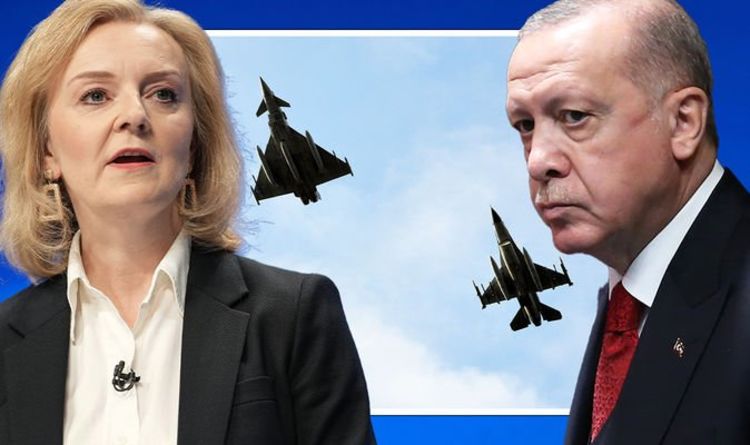

In 2019, the UK halted new export licences for arms sales to Turkey but last December under Boris Johnson‘s orders they resumed normal licencing. The former Foreign Secretary Dominic Raab raised concerns that weapons might be used during military operations in Syria. Mr Raab condemned Turkey’s invasion of Syria, saying: “This is not the action we expected from an ally. It is reckless. It is counterproductive and plays straight into the hands of Russia, and indeed the Assad regime.” President Recep Tayyip Erdogan, who is gearing up to invade Syria, argues his forces are targeting Kurdish groups who he believes are terrorists, but one of the UK’s key allies fighting IS are Kurdish groups.
Mr Raab said once called on Ankara to show “maximum restraint” and warned that incursions against Kurdish groups undermine international effort to defeat IS.
The British Government said licences will only be issued if the applicant can “incontrovertibly demonstrate that the goods will not be used in northeastern Syria.”
It is very unclear how UK trade officials would be able to determine if the arms have been used in Syria or not.
Declassified UK submitted a Freedom of Information request to the Foreign Office and the government refused to provide the information they hold. They said doing so would “prejudice relations” between the UK and Turkey.
The UK’s 2021 Defence Review also says: “Turkey is a crucial NATO Ally.”
Since 2016, Britain has sold nearly a billion pounds worth of military goods to Turkey and has produced laser targeting systems for F-16 bomber aircraft, other warplane components, and bomb racks and guidance systems for Turkey’s Bayraktar-2 drones.
Less than two weeks ago, there was a siege on a prison in northern Syria. IS militants carried out multiple car bombs and it was the largest and most sophisticated attack by IS militants since the group’s fall in 2019.
Many believe that the prison attack was coordinated by Turkish forces — in a bid to free IS fighters — as they have recently stepped up drone attacks in the area. As recently as Tuesday night, Turkish bombing devasted Yazidi — a minority group who have continually been persecuted — villages. And on Christmas Day 2021, a Turkish drone destroyed a youth movement house which was a violation of a 2019 peace treaty.
In response to the recent attacks, Foreign Secretary Liz Truss said: “Ministers and officials maintain regular contact with the Turkish Government and frequently discuss the situation in Syria.”
A report from the Rojava Information Centre reveals that over 40 former ISIS members are “being sheltered, funded and protected by Turkey in the occupied regions” of Syria.
Since 2018, northeast Syria has been under the control of Turkish backed militias who seized control of the city after a two-month operation to remove Kurdish forces. The UN Commission of Inquiry on Syria found vast evidence of daily rape, sexual violence, harassment and torture in the first half of 2020 in the areas under Turkish control.
Atrocities are mirroring what happened to people at the hands of IS, but people are not being tortured by a militant Islamist group they are under the control of a NATO member.
The UK is Turkey’s second-largest export market, and talks are set to begin this year on an even more expansive trade agreement.
France, Germany, the Netherlands and Finland have curbed arms sales to Turkey.
Andrew Smith from the Campaign Against Arms Trade said to The Guardian: “It’s time that the rights of people were finally put ahead of arms company profits.”





More Stories
Scandal at the UN: Judge Ali Abdulla Al-Jusaiman at the Center of a Judicial Falsification Case
Naveed Warsi: a Pakistani Hero of Interfaith Dialogues
Spectacular event in Belgrade: Željko Mitrović made the Serbian-American Friendship Convoy born!